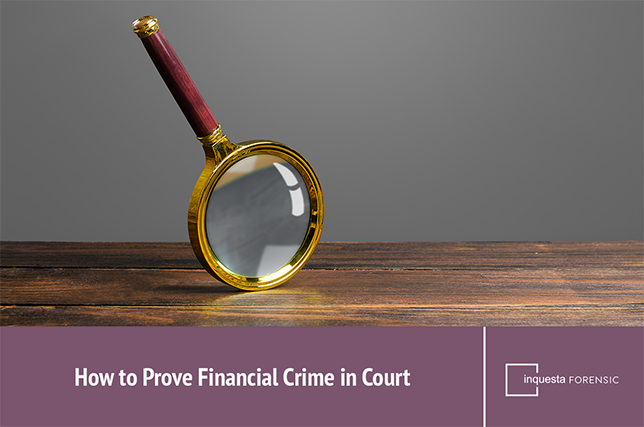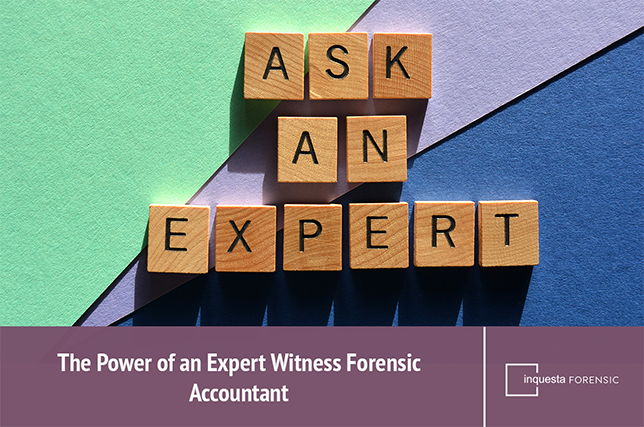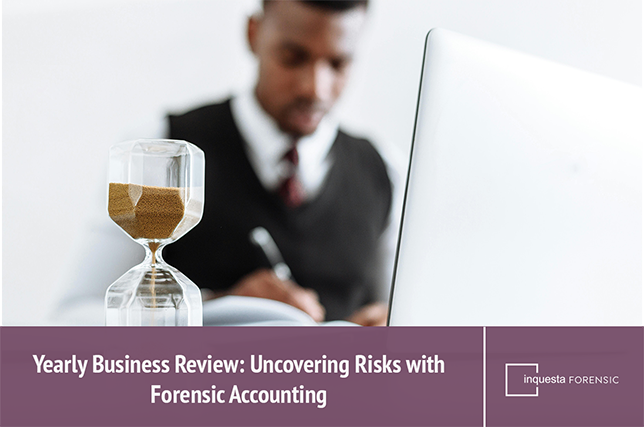A confiscation order is designed to force those deemed to have financially benefited from crime to repay what they have gained.
Unlike other orders with similar end goals, like a forfeiture order, a confiscation order cannot, under normal circumstances, be used to force a defendant to sell important assets, such as property.
However, should a defendant find themselves unable to pay their order without justifiable cause, the situation can escalate quickly and lead to the sale of assets, and jail time.
Find out more about how a confiscation order works, what you can do to protect yourself, and how Inquesta’s team of forensic accountants can assist in our latest blog.
What is a Confiscation Order?
The Proceeds of Crime Act 2002 introduced something known as a ‘confiscation order’. A confiscation order is for when somebody is deemed to have significantly benefited from committing crime, with the intention of facilitating those issued with the order to pay back any such gains, or face further sanction from the court.
A confiscation order can only be handed out in the event of somebody being convicted of, or pleaded guilty to, a crime that it is believed to have greatly benefited them and their financial situation and they are set to be sentenced in the crown court as a result.
The amount a person needs to pay under a confiscation order will be decided based on how much it is deemed that the defendant has earned from their crimes. Traditionally this is calculated by subtracting any priority payments from the value of the defendants realisable assets.
Paying back a confiscation order can require the defendant to sell off their assets, even those considered to have been purchased legitimately. It is possible to appeal a confiscation order if the defendant feels that the amount ordered for them to pay is more than what they gained.
Understanding how a confiscation order works is essential to ensuring you get the best possible result. If you are ever unsure, it is a good idea to seek the guidance of a specialist forensic accountant.
Can You Extend a Confiscation Order?
Under Section Five of the Serious Crime Act 2015, a confiscation order must be paid on the day the order is made. If this is not possible, a defendant will be granted an extension up to three months. This can then be extended again to a maximum of six months if necessary.
Of course, it will be up to the defendant to prove to the court’s satisfaction that they are unable to pay a confiscation order straight away. This will involve putting together a thorough case, something that a specialist forensic accountant can help with.
What Defines Confiscation Cases?
Confiscation cases will generally occur during the process of criminal or civil proceeds, in scenarios where authorities want to attempt to seize assets that are believed to be connected to illegal activities. Determining if a case is, or is not, relevant for a confiscation order involves assessing criminality, tracing assets, consulting legislation, and following proper due process at all times.
The determination of whether or not a case requires a confiscation order will likely require the following criteria:
- Criminal Activity: Confiscation cases are primarily linked to criminal behaviour (drug trafficking, fraud, corruption, etc.). Authorities may only hand out a confiscation order if they are believed to have evidence that connects assets with criminal conduct.
- Legal Process: Confiscation cases usually follow a criminal conviction. Once a person is found guilty of the crime they are accused of, the court may then order the confiscation of assets. Without this, a confiscation order will not be approved.
- Can Assets be Traced: Authorities must be able to trace and identify assets that could be considered proceeds of crime for an order to be handed out.
- Consult Legislation: Confiscation laws can vary at times, depending on severity, jurisdiction, and other factors.
- Burden of Proof: The burden of proof is reversed during confiscation proceedings. This means that it is the duty of the defendant to prove their legitimacy, rather than the prosecution having to demonstrate tangible links between a person’ s assets and their criminality.
- Due Process: A defendant must be afforded their given due process rights. This includes the right to be heard, present a defence, and challenge the order. Can You Extend a Confiscation Order?
A confiscation order can be extended if the application to extend is made before the original period has expired. Prior to 2023, the total amount of time that a defendant could be allowed to pay their confiscation order was 12 months. However, in March ‘23, this was reduced to six months.
Of course, it will be up to the defendant to prove, to the court’s satisfaction, that they are unable to pay a confiscation order straight away as intended. This will involve putting together a thorough case, something that a specialist forensic accountant can help with.
What is a Confiscation Order Default Sentence?
A confiscation order default sentence is a prison sentence that the defendant may be expected to serve should they fail to pay off their confiscation order amount within the timeframe specified by the court (usually three months). The confiscation order default sentence will be determined based on the amount expected to be repaid.

The confiscation order default sentence periods are as follows: :
- Less than £10,000 = Six months
- £10,000-£500,000 = Five years
- £50,000-£1 million = Seven years
- More than £1 million = 14 years.
Once the court rules on a confiscation order, the defendant will only have the three month window (or however long is stated in the specific case) to get their affairs in order and pay back their outstanding debt. It should be noted that this may not be the case if the defendant has an ongoing appeal or extenuating circumstances.
A failure to repay the money stated in the confiscation order will result in the immediate activation of the defendant’s default sentence. The process to activate a confiscation order default sentence will take place in the magistrates court once the repayment window has expired.
The enforcement hearing acts separately from the initial confiscation order hearing, therefore it is no longer possible at this stage for the defendant to argue that the initial figure of the confiscation was incorrect and needed to be lowered.
Any sentence issued will act as a consecutive sentence and can be added on to any previously held sentence.
A defendant required to pay back more than £1 million is required to serve the entirety of their sentence due to the severity of the theft. For defendants with lesser sentences, release will be reduced to half if the outstanding amount is paid off in full (this factors in if an appeal to the initial amount is successful).
Confiscation Order Appeals
Confiscation order appeals are possible if the defendant can show that their assets are not sufficient to fully pay the order. The court can then make a fresh set of calculations based on the available amount. However, if it is found that the defendant has additional assets not previously stated following a confiscation order appeal, the amount could be increased.
In order for a successful confiscation order appeal, the defendant must first apply for a certificate of inadequacy from the High Court. Once this has been issued, the defendant will then be able to apply to the Crown Court for the balance remaining to be reissued. The court may then lower the amount by as much or as little as they deem fit.
Should the amount be reduced by the court, the defendant’s confiscation order default sentence could also be reduced.
How to Pay a Confiscation Order
A confiscation order is payable directly to the magistrates’ court. Generally, Her Majesty’s Courts and Tribunal Service (HMCTS) will act as enforcers of confiscation orders, attempting to help defendants to pay their order. More complex cases are handled by the Criminal Prosecution Service Proceeds of Crime (CPSPOC) team who will act as lead enforcers for the case.

When assisting with the enforcement of a confiscation order, HMCTS will act using powers available to the magistrates court and not those of an official prosecutor. This is due to the relative simplicity of the cases handled by the HMCTS team.
CSPOC on the other hand, as enforcers of the most complex confiscation order cases are bestowed with all the powers of a prosecutor, and will likely also work with police, estate agents, banks, and more in order to assist the defendant in finding a way to pay their order.
If repayment of the full amount is proving difficult, the CSPOC is able to apply to the crown court for the appointment of an independent officer, an Enforcement Receiver to the case. An Enforcement Receiver is not part of the prosecution team, and is instead given unique powers to sell assets in order to raise the full amount needed to pay the order.
How Inquesta Can Help with Confiscation Order Hearings
The initial figure in a confiscation can often be overly harsh when compared to the actual crime committed.
Lowering the amount in a confiscation order can be a difficult and lengthy process. However, a dedicated, expert forensic accountant will possess all of the skill and knowledge required to prove that the amount should be lowered on your behalf.
A forensic accountant possesses the required expertise to analyse relevant data and documents in order to uncover new evidence regarding things such as legitimate income, in order to separate it from the amount deemed to have been gained through crime, they can also accurately trace payments between multiple parties to attempt to prove legitimacy, and lower the amount owed.
Inquesta possesses a world class team of expert forensic accountants with all the skill needed to help with confiscation order hearings.
We have been instructed in confiscation order cases for years, meaning that we know all of the intricacies and stumbling blocks that can arise during the process, and know exactly how to avoid them to get you the best result possible.
Instructing a forensic accountant with Inquesta means a quality, thorough service designed with our clients in mind. If you are unsure about how a confiscation order works, or need our specialist guidance, contact our team or request a free consultation today.
- Your Partner’s Been Convicted: Can They Take Your House? What Section 10a POCA Means For You
- The Essential Role of Forensic Accounting in High Net Worth Divorce
- How to Value a Startup Business: A Guide for UK Entrepreneurs
- Pig Butchering Scams: Guide to Crypto Romance Fraud
- Shareholders’ Disputes: How Business Valuation Helps with Shareholder Dispute Resolution








